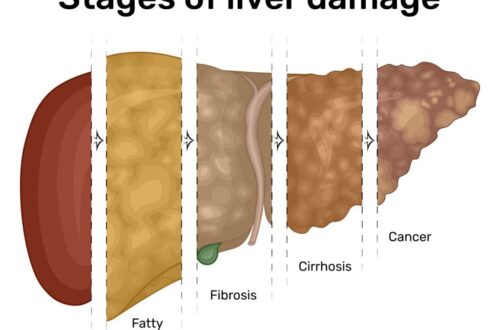Liver cancer, like many cancers, often doesn’t show symptoms in its early stages. However, as the disease progresses, there are signs you can look out for. Knowing these symptoms can guide you to seek medical advice early, which can make a significant difference in diagnosis and treatment.
This guide outlines the common symptoms of liver cancer. While experiencing any of these symptoms doesn’t necessarily mean you have liver cancer, it’s important to consult a healthcare professional for further evaluation.
Common Symptoms of Liver Cancer
1. Unexplained Weight Loss
Losing weight without trying could be an early warning sign. This symptom occurs because cancer can disrupt the body’s energy balance and metabolism.
What to do: Monitor sudden drops in weight and discuss them with your healthcare provider.
2. Loss of Appetite
People with liver cancer may feel less hungry than usual, leading to reduced food intake and secondary weight loss.
What to do: Keep track of how your appetite fluctuates, especially if it persists for weeks.
3. Abdominal Pain or Swelling
You may feel pain or discomfort in the upper right side of your abdomen, where the liver is located. Swelling in this area, caused by an enlarged liver or fluid buildup, is also common.
What to do: If the pain feels persistent or sharp and includes visible swelling, it’s time to consult a doctor.
4. Fatigue and Weakness
Feeling constantly tired or weak without a clear reason could be related to liver cancer. Cancer can drain energy resources in the body.
What to do: Address persistent fatigue by speaking with your physician, especially if it affects your daily life.
5. Jaundice (Yellowing of the Skin and Eyes)
Jaundice occurs when the liver has trouble processing bilirubin, a substance that comes from broken-down red blood cells. It causes the whites of your eyes and skin to turn yellow, often accompanied by dark urine.
What to do: Seek medical attention immediately if this symptom develops.
6. Nausea or Vomiting
Some individuals with liver cancer experience frequent nausea or episodes of vomiting.
What to do: Keep a symptom journal noting how often and when the nausea occurs and share it with your healthcare provider.
7. A Lump Below the Ribs
A noticeable lump or mass may develop under the right side of your ribs due to an enlarged liver or tumor growth.
What to do: If you feel a lump that wasn’t there before, contact your doctor for an evaluation.
8. Dark Urine or Pale Stool
Changes in urine or stool color can signal issues with bile production, often linked to liver dysfunction or liver cancer.
What to do: Note any recurring changes in bathroom habits and share them during medical checkups.
9. Swelling in the Legs and Ankles
Liver cancer can sometimes cause fluid retention, leading to noticeable swelling in the lower parts of the body.
What to do: Elevate your legs and reduce salt intake, but ensure you address this with a healthcare professional.
When to See a Doctor
If you’re noticing one or more of these symptoms, especially if they persist over a few weeks, it’s important to seek medical advice. Remember, these symptoms can also be caused by other conditions, so a proper evaluation is critical. Early diagnosis significantly impacts treatment outcomes.
Supporting Your Health
While some risk factors for liver cancer, such as genetic predisposition, cannot be controlled, there are health measures you can take to support your liver:
- Avoid excessive alcohol consumption.
- Maintain a healthy weight.
- Seek treatment for underlying conditions like hepatitis B or C.
- Stay consistent with regular health checkups.
By being attentive to your body and proactive about your health, you can protect yourself and catch potential issues early. If you’re concerned about liver cancer or related symptoms, taking the first step to consult a medical professional can make all the difference.


